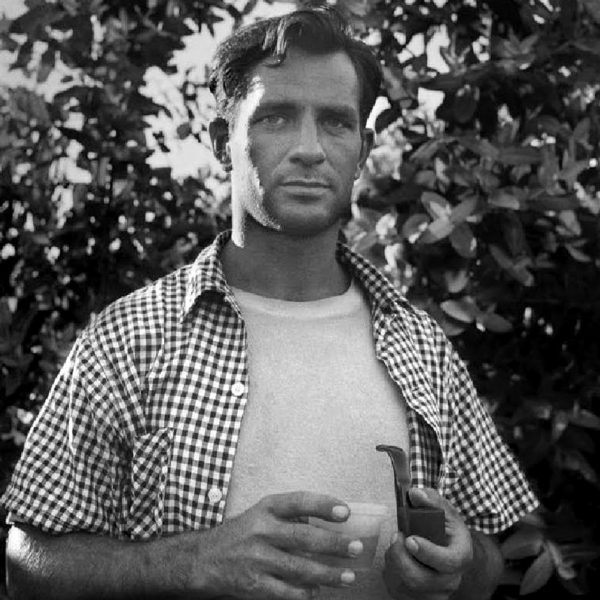
We can now add beat novelist Jack Kerouac to the list of male authors hopelessly infatuated with Marilyn, as described by Dave Krajicek in an article for Salon. Kerouac never met Marilyn, though she owned a copy of his classic 1957 novel, On the Road.
Kerouac made a rather crass remark about Marilyn’s passing, saying she was “f—– to death.” He also nurtured a rescue fantasy towards MM, and made similarly puerile remarks about the tragic deaths of Jean Harlow and Carole Lombard.
“Sir, I would have given [MM] love,” he told his friend Lucien Carr. “By telling her that she was an Angel of Light and that Clifford Odets and Lee Strasberg and all the others were the Angels of Darkness and to stay away from them and come with me to a quiet valley in the Yuma desert, to grow old together like ‘an old stone man and an old stone woman’…to tell her she really, is really, Marylou.”
Here is an extract from Krajicek’s article:
“‘Marylou’ refers to another character in On the Road, a ‘beautiful little chick’ based on Luanne Henderson, Neal Cassady’s real-life adolescent bride. Kerouac wrote, ‘Marylou was a pretty blonde…But, outside of being a sweet little girl, she was awfully dumb and capable of doing horrible things.’ It seems absurd that Kerouac conflated or equated Monroe, one of the most powerful women in Hollywood, with Cassady’s child-wife, who was fifteen when they married. But it’s also a telling detail that Kerouac imagined – saw himself as – Monroe’s protector, her superhero.
Kerouac’s misogyny already has inspired a cottage industry of commentary. One contemporary writer calls the Beats ‘immature dicks.’ Another suggests it is unrealistic to consider Kerouac (or any writer) outside the context of his or her times.
So Kerouac was ‘of his time,’ to use a tired phrase. And some use the same excuse for the Ku Klux Klan.
In 1962, the inaugural edition of Ms. Magazine was still a decade away. But Betty Friedan’s The Feminine Mystique was in the publishing pipeline that year, and the English-language edition of Simone de Beauvoir’s The Second Sex had been available since 1953.
Kerouac’s Monroe letter must be regarded as exceptionally repulsive. And the passage of time adds context that makes its content even more significant. Marilyn Monroe has advanced in stature from a sex symbol to a cultural icon to an influential proto-feminist figure. She has transcended mere sexuality—for those able to see beyond her exterior.”
Krajicek is right to condemn Kerouac’s creeping misogyny. Norman Mailer, who wrote a ‘factoid biography’ of Marilyn, was also fixated by her sexuality – but at least Mailer credited her with some strength and intelligence, too.
“In fact, Jack, you don’t deserve her—never did, never will,” Krajicek concludes: and it’s hard to disagree.